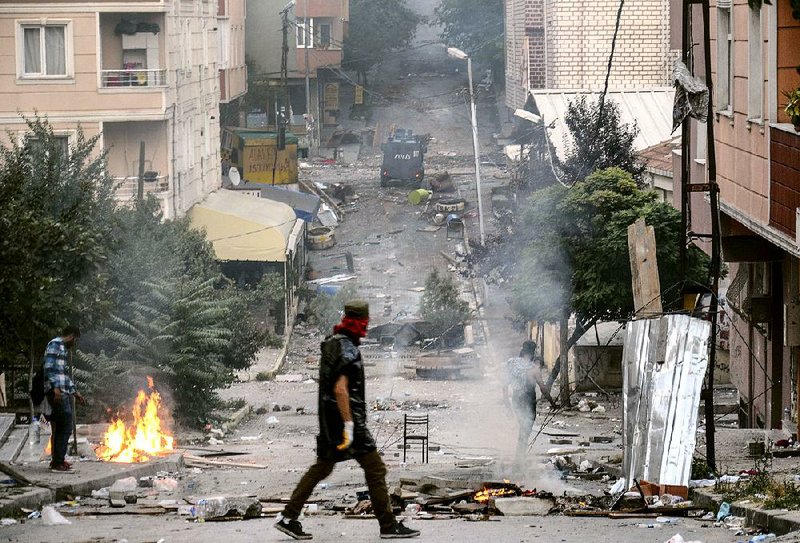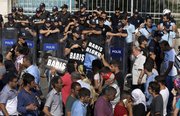ANKARA, Turkey -- Turkey on Sunday called for a meeting of its NATO allies to discuss threats to its security and its airstrikes targeting Islamic State militants in Syria and Kurdish rebels in Iraq.
The move came as Turkey's state-run media reported that Turkish F-16 jets again took off from the country's southeastern Diyarbakir air base to hit Kurdistan Workers' Party targets across the border in northern Iraq.
There was no immediate confirmation of the report by TRT television, which occurred hours after authorities said Kurdistan Workers' Party militants detonated a car bomb near Diyarbakir, killing two soldiers and wounding four others.
Meanwhile, Turkish and U.S. officials outlined an agreement to allow U.S. aircraft fighting the Islamic State to fly out of a Turkish air base.
NATO announced that its decision-making body, the North Atlantic Council, will convene Tuesday after Turkey invoked the alliance's Article 4, which allows member states to request a meeting if they feel their territorial integrity or security is under threat.
The Turkish Foreign Ministry said Turkey would inform allies about the airstrikes, which followed an Islamic State suicide bombing near Turkey's border with Syria that left 32 people dead July 20 and an Islamic State attack on Turkish forces that killed a soldier. Those killed in the suicide bombing were mostly young, pro-Kurdish activists.
Turkey requested the meeting, which includes ambassadors of all 28 member countries, "in view of the seriousness of the situation after the heinous terrorist attacks in recent days, and also to inform allies of the measures it is taking," NATO said.
NATO is not involved in operations against the Islamic State, although many of its members are. As an alliance, however, NATO is committed to helping defend Turkey.
Turkey and the United States have agreed on the outlines of a de facto "safe zone" along the Turkey-Syria border under the terms of a deal that is expected to significantly increase the scope and pace of the U.S.-led air war against the Islamic State in northern Syria, according to U.S. and Turkish officials.
The agreement includes a plan to drive the Islamic State out of a 68-mile-long area west of the Euphrates River and reaching into the province of Aleppo that would then come under the control of the Syrian opposition. If fully implemented, the plan would also bring American planes in regular, close proximity to bases, aircraft and air defenses operated by the Syrian government and directly benefit opposition rebels fighting President Bashar al-Assad's regime.
Operations in the targeted area would stop short of meeting long-standing Turkish demands for a full-scale, declared no-fly zone, but the area could eventually become a protected haven for some of the estimated 2 million Syrian civilians who have fled to Turkey.
The first word of the agreement came Friday, when Turkey said it had agreed to allow armed U.S. aircraft to fly out of its base at Incirlik.
Additional details, including the composition of Syrian opposition forces that are to be inserted on the ground to hold the protected area, are still being worked out, according to the officials, who spoke on the condition of anonymity to discuss the evolving operations.
"When areas in northern Syria are cleared of the [Islamic State] threat, the safe zones will be formed naturally," Turkish Foreign Minister Mevlut Cavusoglu said in Ankara, the capital, Saturday. "People who have been displaced can be placed in those safe areas."
U.S. officials did not dispute the Turkish description and said U.S. and coalition air cover would effectively operate around the clock as Islamic State targets were located. But they said the United States would not officially designate the area -- about 40 miles deep into Syria along the 68-mile stretch of border -- a protected zone.
Turkey has simultaneously bombed Islamic State positions near its border with Syria and Kurdish insurgents in northern Iraq. It has also carried out widespread police operations against suspected Kurdish and Islamic State militants and other outlawed groups inside Turkey. Hundreds of people have been detained.
Tensions flared with the Kurds after the July 20 suicide bombing, as Kurdish groups blamed the government for not doing enough to prevent Islamic State operations. On Wednesday, the Kurdistan Workers' Party claimed responsibility for the killing of two policemen in the Kurdish majority city of Sanliurfa.
The Kurdistan Workers' Party has said Turkey's airstrikes likely spell the end of a cease-fire announced in 2013.
The group has fought Turkey for autonomy for Kurds in a conflict that has claimed tens of thousands of lives since 1984.
The European Union's foreign policy chief, Federica Mogherini, expressed support for Turkey's efforts against terror groups, including the Islamic State, in a telephone conversation with Cavusoglu but also urged Turkey to keep the peace process with the Kurds "alive and on track."
Similarly, the German government said Chancellor Angela Merkel spoke by phone Sunday with Turkish Prime Minister Ahmet Davutoglu and assured him of "Germany's solidarity and support in the fight against terrorism."
A statement from Davutoglu's office said the Turkish leader told Merkel that Turkey would take all measures needed to fight terrorism and would resume cross-border raids when deemed necessary while continuing "to take steps toward a [Kurdish] settlement and democratization."
The state-run Anadolu Agency said Turkish President Recep Tayyip Erdogan and Russian President Vladimir Putin spoke by phone Sunday about issues including Syria. The call was initiated by Erdogan, the agency said.
Authorities banned a peace rally scheduled for Sunday in Istanbul to denounce last week's suicide bombing, on grounds that it may be used by outlawed groups for "provocative" acts. Organizers instead read out a brief statement to a crowd of some 1,000 who dispersed peacefully.
Information for this article was contributed by Suzan Fraser, John-Thor Dahlburg, Geir Moulson, Josh Lederman and Darlene Superville of The Associated Press and by Alan Bjerga, Taylan Bilgic and Benjamin Harvey of Bloomberg News.
A Section on 07/27/2015

